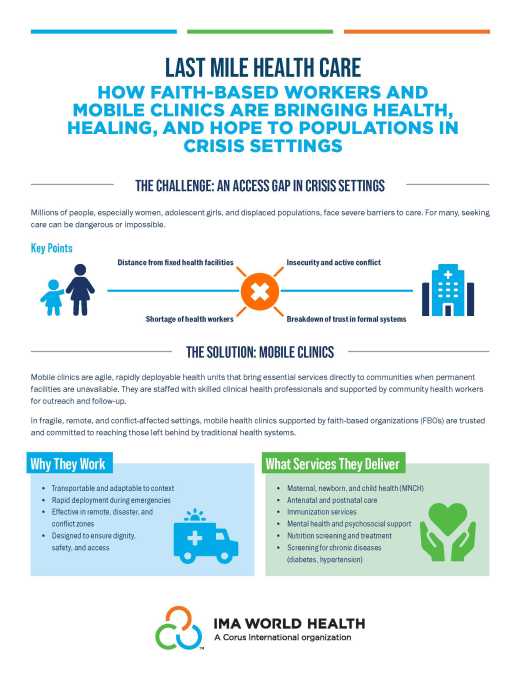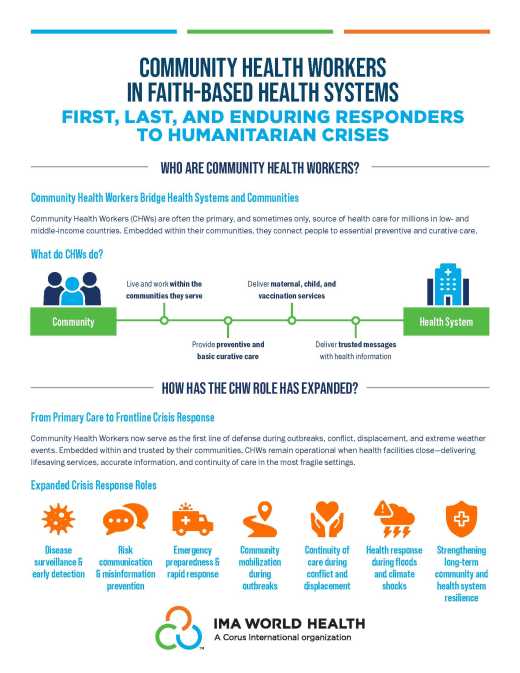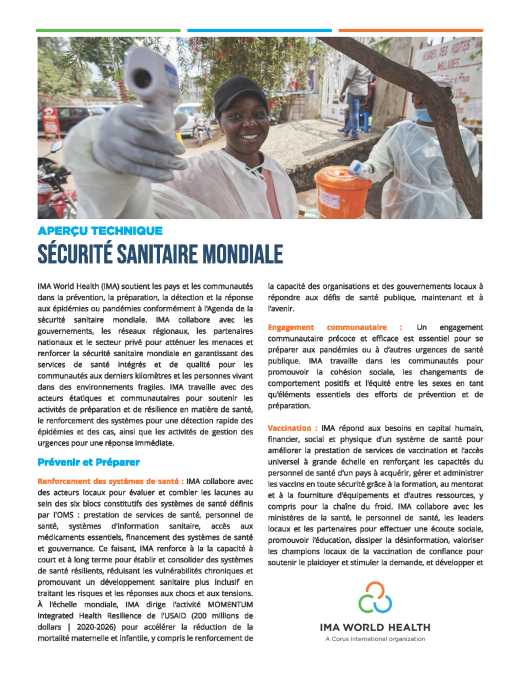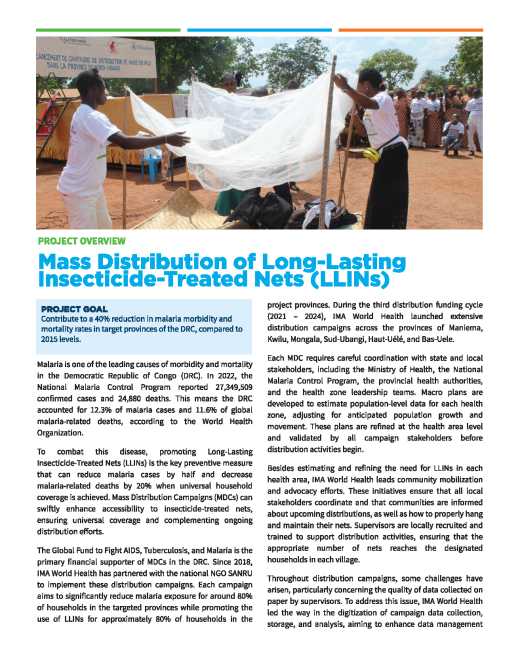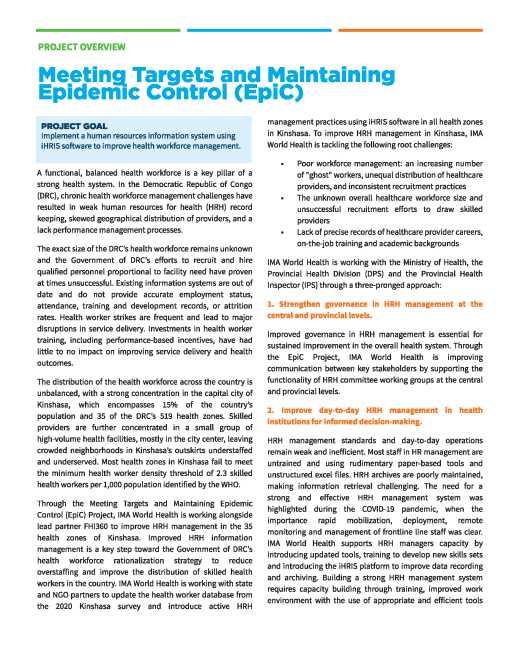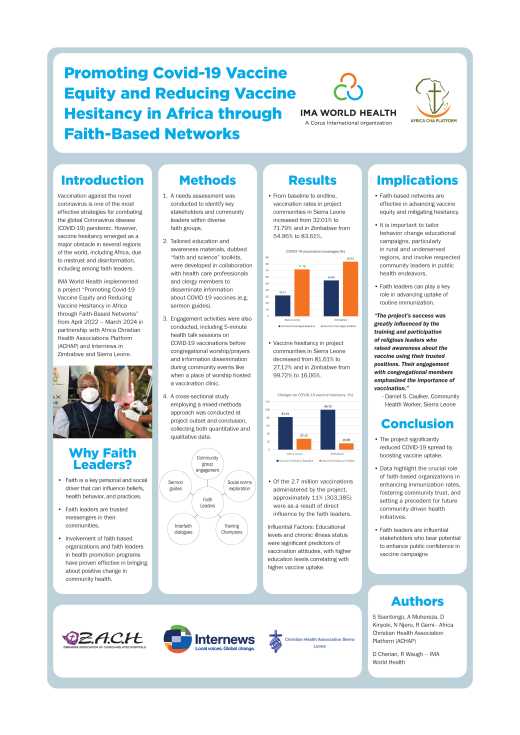Since 2002, IMA World Health has built and supported integrated, holistic and sustainable health systems that increase access to quality health care in fragile countries, including what is needed to support robust immunization programs. IMA World Health works with local governments and other partners to provide quality health facility- and community- based immunization services, specializing in vaccine delivery, acceptance and uptake, safety monitoring and monitoring systems.
Vaccine service delivery
We address the human, financial, social and physical capital needs of a health system to improve its vaccine service delivery and universal access at scale with an emphasis on women and youth. We strengthen the capacities of a country’s health workforce to safely procure, manage and deliver vaccines through training, mentoring, and the provision of equipment and other resources, including for the cold chain.
Vaccine acceptance and uptake
We collaborate with ministries of health, health care workers, local leaders and partners to conduct social listening, promote education, dispel misinformation, uplift trusted local vaccine champions to support advocacy and fuel demand, and develop and execute on risk communication and community engagement (RCCE) plans.
Safety monitoring
We work closely with ministries of health to ensure a system is in place to respond to adverse events and other unanticipated outcomes during immunization programming. We train health workers and community drug distributors (CDDs) to identify, treat (or refer for treatment) and report to the World Health Organization (WHO) and drug donation program any severe adverse effects (SAEs). Public service announcements are also utilized to encourage anyone to report an adverse event following immunization (AEFI) should they experience one.
Monitoring systems
We help governments and health facilities utilize health information and reporting software, such as DHIS2, to effectively monitor program implementation, allocate resources, and make data-driven decisions to improve vaccine service delivery.
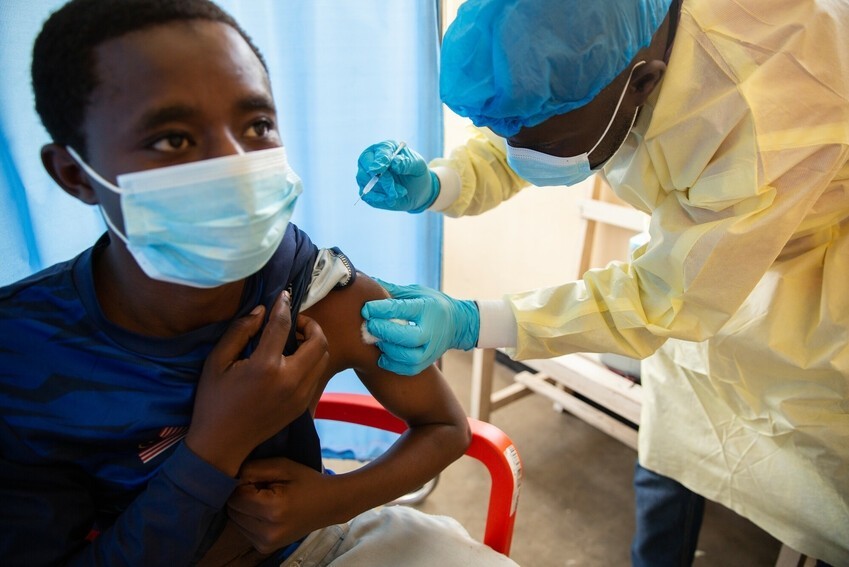
Ernest Chirubala receives his first round of the COVID-19 vaccine from Nurse Kalinda at a health center in Goma, DRC.
Country Highlight
In the Democratic Republic of Congo (DRC), IMA World Health has supported the Ministry of Health and local partners in implementing immunization programs since 2002. Our vaccine initiatives have reached more than 8 million people and have helped maintain approximately 98% coverage for child immunizations. We also purchased and installed over 500 direct drive solar refrigerators and freezers, boosting regional vaccine stocks and ensuring appropriate vaccine transport.
Project Highlights
IMA World Health leads the implementation of the CDC-funded Strengthening Immunization Program in the Democratic Republic of Congo (DRC) and the Philippines. The program aims to strengthen public health systems to prevent, detect, and respond to vaccine-preventable diseases like measles, rubella, and polio. By improving surveillance, immunization, data quality, and community engagement, the program will close immunity gaps, enhance outbreak response, and build local capacity through training and innovative tools. In the Philippines, activities include revising health investment plans, training for over frontline workers, improving reporting systems for private providers, and creating digital learning resources. In the DRC, efforts focus on reaching unvaccinated children, supporting health facilities, and providing technical assistance for national vaccination campaigns, laying the groundwork for long-term public health improvements.
Under the US government-funded MOMENTUM Integrated Health Resilience (MIHR) project, IMA World Health leads efforts to strengthen vaccine delivery systems for children under five in fragile and conflict-affected settings (CAF). As a global leader in immunization, MIHR contributes to creating resilient health systems and participates in global immunization working groups, such as the West and Central Africa Regional Working Group on Immunization. MIHR played a key role in the 2023 “Big Catch-up Plan,” a global initiative to restore child immunization levels impacted by the COVID-19 pandemic, by providing guideline development, implementation, and monitoring expertise.
To reduce the number of zero-dose and under-immunized children, MIHR supported Ministries of Health (MOHs) in South Sudan, Mali, DRC, Niger, and Burkina Faso by reviewing and implementing the Reaching Every District/Reaching Every Community (RED/REC) approach. This included training health managers, trainers, and providers on immunization programming, service delivery, and cold chain maintenance. MIHR also developed tools and job aids, facilitated community-based vaccination services, and supported integrated health campaigns, reaching over 1,065,000 under-five children with DPT vaccines over three years.
MIHR also strengthened Emergency Preparedness and Disease Outbreak Response Plans (EPRPs) in supported countries, enabling timely responses to outbreaks like measles and polio in South Sudan and DRC. Additionally, MIHR helped integrate COVID-19 vaccines into routine immunization programs in Burkina Faso, Mali, and DRC, leading efforts in Risk Communication and Community Engagement (RCCE). These initiatives ensured COVID-19 vaccines became part of primary health care services, further enhancing health system resilience.
Between 2012 and 2021, ASSP and its follow-on project ASSR improved the health of women, adolescents and children through support for disease prevention, delivery of health care and health systems strengthening in the DRC. With funding from the UK’s Foreign, Commonwealth & Development Office (FCDO), the projects supported an estimated 9.7 million people across 52 health zones in five provinces, strengthening the health system by focusing on priority interventions such as the treatment of malaria, pneumonia and diarrhea; nutrition; obstetric and neonatal care; water, sanitation and hygiene (WASH); and immunization. Because measles outbreaks are frequent and a leading killer of young children in the DRC, IMA World Health vaccinated more than 2 million children under the age of five against measles throughout the duration of ASSP, ASSR, and SEMI. During ASSP, IMA also led the implementation of the second iteration of the District Health Information System (DHIS2) in the project's 52 health zones. We supported everything from hardware installation to training in use and maintenance to the development of national health information policies. At the end of the project, 99% of health facilities were using DHIS2 to produce their SNIS reports. IMA investments in the health information system design and data collection yielded marked improvement in data quality scores, with 39 health zones obtaining a score of 80% or more.
In partnership with South Sudan’s Ministry of Health and with funding from the World Bank, IMA led the Rapid Results Health Project from 2013 to 2018 to increase access to health services to over 3 million people living in the conflict-affected Greater Upper Nile and Greater Jonglei regions. As part of the project, IMA designed, and co-led with the MoH, the annual “Dry Season Campaigns” to provide routine and catch-up immunization to tens of thousands of children.
Funded by the US government and led by RTI International, the Act to End NTDs | East project assisted national neglected tropical disease (NTD) control programs to eliminate and mitigate NTDs. IMA collaborated with Tanzania’s MoH to conduct mass drug administrations (MDA) in 19 regions and 134 districts throughout Tanzania, training more than 3,400 front line health workers, 8,900 teachers and 35,700 community drug distributors to support treatment for over 20 million individuals annually. The trainings emphasized preventing, identifying, and reporting SAEs. In Haiti, IMA supported the Haiti Neglected Tropical Disease Control Program (HNTDCP) to conduct MDA in 22 communes across the country aimed at lymphatic filariasis (LF) elimination and soil-transmitted helminthiasis (STH) control. IMA tracked progress toward LF elimination through transmission assessment surveys (TAS). Based on TAS results, 122 out of 140 communes are under surveillance and no longer require MDA (87%) for LF. IMA and partner staff also utilized digital hardware and software—from smartphones and tablets to Geographic Information Systems (GIS)—to make near real-time, data-informed decisions for optimum project implementation.
Throughout Sub-Sahara Africa, IMA is strengthening the capacity of Christian Health Association networks (CHAs) to deliver the COVID-19 vaccine in their respective countries. Through its CoV-FaB project, IMA supported CHAs in eight countries (Zimbabwe, Sierra Leone, Tanzania, Liberia, Cote d’Ivoire, Zambia, Madagascar, and Central African Republic) to administer vaccines, conduct outreach, train faith leaders, and improve infection control and prevention protocols (ICP). Over the course of the project, the CHAs’ member institutions administered 2,757,615 doses of vaccines. Significant improvements in vaccination rates were recorded in the project's focus countries, with baseline vaccination rates in Zimbabwe rising from 48.6% to 77% for the first dose and from 31.7% to 61% for full vaccination. Similarly, Sierra Leone saw an increase from 34% to 66.8% for the first dose and from 25% to 53.4% for full vaccination.
With funding from the U.S. Government, IMA supports IDPs, host communities, and returnees across 16 bomas in the fragile contexts of Ayod, Nyirol, Fangak, and Canal/Pigi counties in South Sudan's Jonglei state through the JESI Plus project. IMA deploys mobile outreach teams to deliver vaccines, enabling on-site immunization and surveillance for vaccine-preventable diseases.
With funding from Clinton Health Access Initiative (CHAI), IMA is supporting efforts to improve the effectiveness and operational efficiency of vaccine campaigns (polio eradication and yellow fever) through digitization. The initiative introduced an integrated Ministry of Health-owned approach to campaign digitization using the Android App, DHIS2 Capture. The app is used to improve the timeliness and capture data on counts, vaccinations, stock management, team supervision, and monitoring. IMA's team piloted the initiative for the polio eradication campaign in Haut-Lomami Province in DRC. The integration of digital tool into this campaign improved data collection and analysis, ensured effective coordination of teams on the ground, and improved the traceability of vaccinated children.



